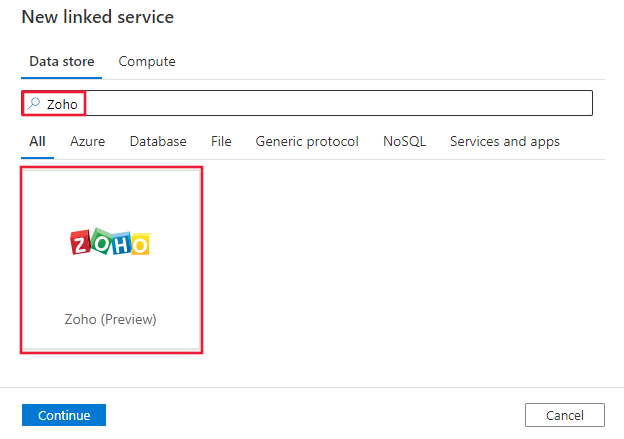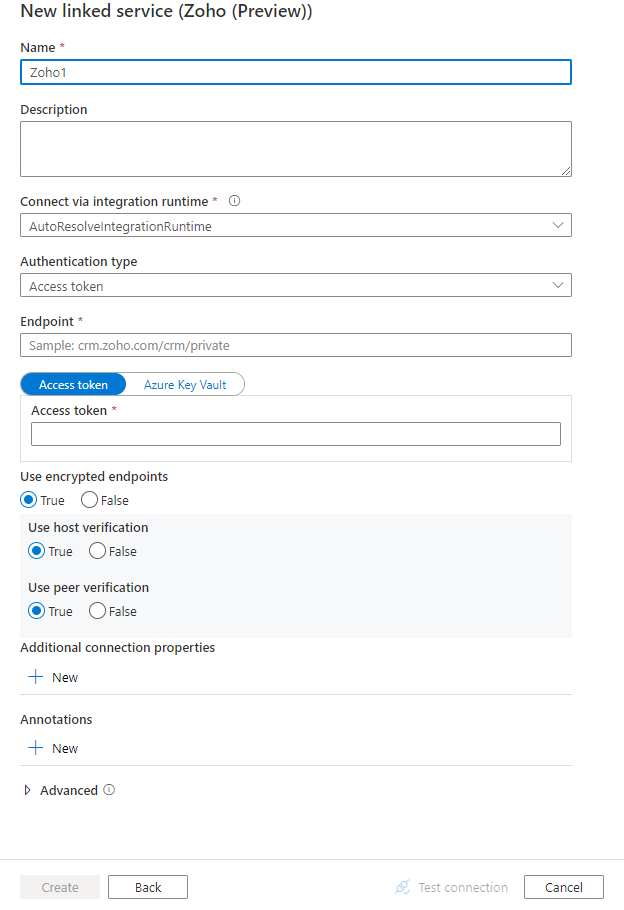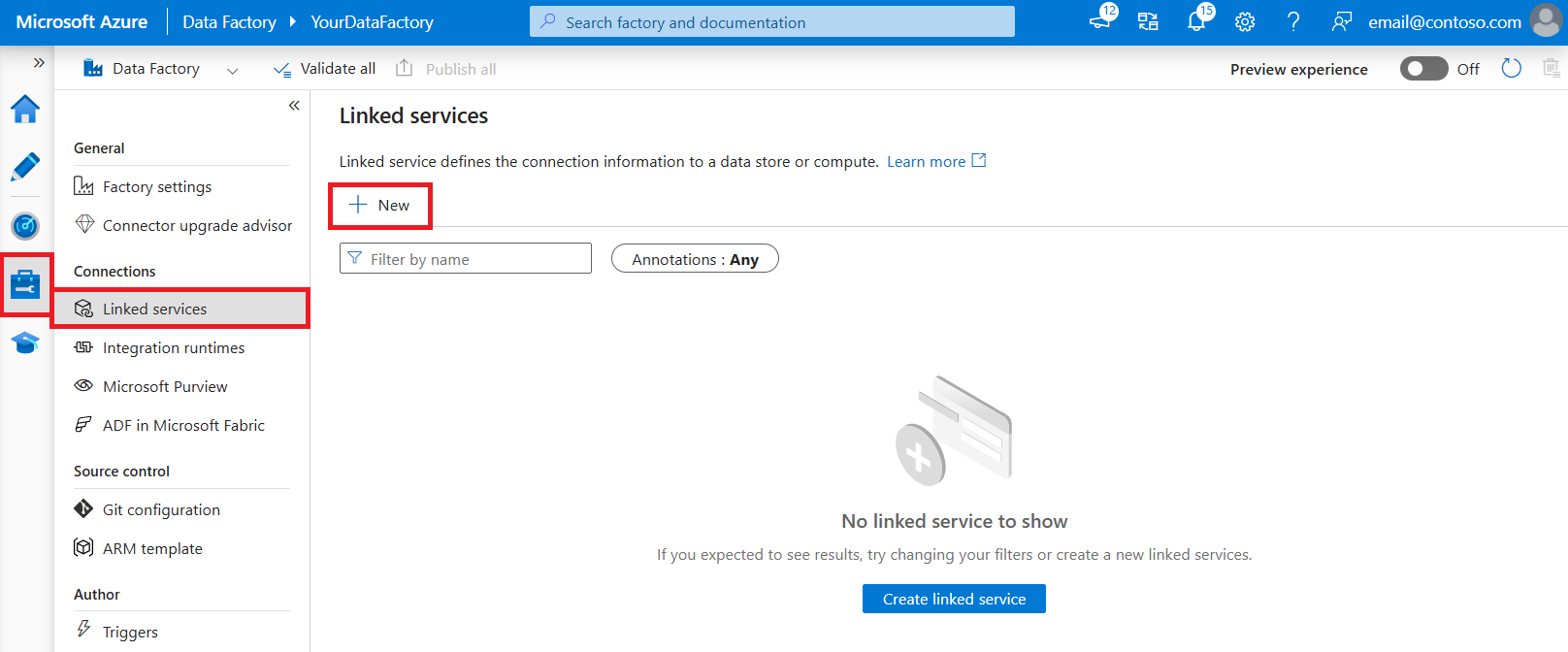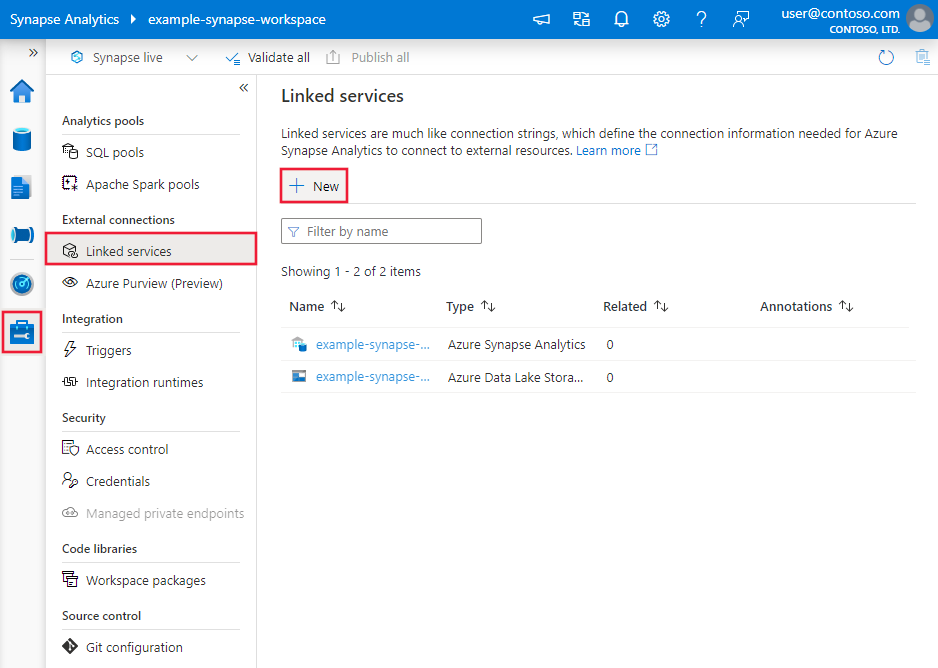Note
Access to this page requires authorization. You can try signing in or changing directories.
Access to this page requires authorization. You can try changing directories.
APPLIES TO:  Azure Data Factory
Azure Data Factory  Azure Synapse Analytics
Azure Synapse Analytics
Important
This connector is at End of Support stage. You are recommended to migrate to ODBC connector by installing a driver.
This article outlines how to use the Copy Activity in an Azure Data Factory or Synapse Analytics pipeline to copy data from Zoho. It builds on the copy activity overview article that presents a general overview of copy activity.
Supported capabilities
This Zoho connector is supported for the following capabilities:
| Supported capabilities | IR |
|---|---|
| Copy activity (source/-) | ① ② |
| Lookup activity | ① ② |
① Azure integration runtime ② Self-hosted integration runtime
For a list of data stores that are supported as sources/sinks, see the Supported data stores table.
This connector supports Xero access token authentication and OAuth 2.0 authentication.
The service provides a built-in driver to enable connectivity, therefore you don't need to manually install any driver using this connector.
Getting started
To perform the copy activity with a pipeline, you can use one of the following tools or SDKs:
- Copy Data tool
- Azure portal
- .NET SDK
- Python SDK
- Azure PowerShell
- REST API
- Azure Resource Manager template
Create a linked service to Zoho using UI
Use the following steps to create a linked service to Zoho in the Azure portal UI.
Browse to the Manage tab in your Azure Data Factory or Synapse workspace and select Linked Services, then click New:
Search for Zoho and select the Zoho connector.

Configure the service details, test the connection, and create the new linked service.

Connector configuration details
The following sections provide details about properties that are used to define Data Factory entities specific to Zoho connector.
Linked service properties
The following properties are supported for Zoho linked service:
| Property | Description | Required |
|---|---|---|
| type | The type property must be set to: Zoho | Yes |
| connectionProperties | A group of properties that defines how to connect to Zoho. | Yes |
Under connectionProperties: |
||
| endpoint | The endpoint of the Zoho server (crm.zoho.com/crm/private). |
Yes |
| authenticationType | Allowed values are OAuth_2.0 and Access Token. |
Yes |
| clientId | The client ID associated with your Zoho application. | Yes for OAuth 2.0 authentication |
| clientSecret | The clientsecret associated with your Zoho application. Mark this field as a SecureString to store it securely, or reference a secret stored in Azure Key Vault. | Yes for OAuth 2.0 authentication |
| refreshToken | The OAuth 2.0 refresh token associated with your Zoho application, used to refresh the access token when it expires. Refresh token will never expire. To get a refresh token, you must request the offline access_type, learn more from this article. Mark this field as a SecureString to store it securely, or reference a secret stored in Azure Key Vault. |
Yes for OAuth 2.0 authentication |
| accessToken | The access token for Zoho authentication. Mark this field as a SecureString to store it securely, or reference a secret stored in Azure Key Vault. | Yes |
| useEncryptedEndpoints | Specifies whether the data source endpoints are encrypted using HTTPS. The default value is true. | No |
| useHostVerification | Specifies whether to require the host name in the server's certificate to match the host name of the server when connecting over TLS. The default value is true. | No |
| usePeerVerification | Specifies whether to verify the identity of the server when connecting over TLS. The default value is true. | No |
Example: OAuth 2.0 authentication
{
"name": "ZohoLinkedService",
"properties": {
"type": "Zoho",
"typeProperties": {
"connectionProperties": {
"authenticationType":"OAuth_2.0",
"endpoint": "crm.zoho.com/crm/private",
"clientId": "<client ID>",
"clientSecret": {
"type": "SecureString",
"value": "<client secret>"
},
"accessToken": {
"type": "SecureString",
"value": "<access token>"
},
"refreshToken": {
"type": "SecureString",
"value": "<refresh token>"
},
"useEncryptedEndpoints": true,
"useHostVerification": true,
"usePeerVerification": true
}
}
}
}
Example: access token authentication
{
"name": "ZohoLinkedService",
"properties": {
"type": "Zoho",
"typeProperties": {
"connectionProperties": {
"authenticationType":"Access Token",
"endpoint": "crm.zoho.com/crm/private",
"accessToken": {
"type": "SecureString",
"value": "<access token>"
},
"useEncryptedEndpoints": true,
"useHostVerification": true,
"usePeerVerification": true
}
}
}
}
Dataset properties
For a full list of sections and properties available for defining datasets, see the datasets article. This section provides a list of properties supported by Zoho dataset.
To copy data from Zoho, set the type property of the dataset to ZohoObject. The following properties are supported:
| Property | Description | Required |
|---|---|---|
| type | The type property of the dataset must be set to: ZohoObject | Yes |
| tableName | Name of the table. | No (if "query" in activity source is specified) |
Example
{
"name": "ZohoDataset",
"properties": {
"type": "ZohoObject",
"typeProperties": {},
"schema": [],
"linkedServiceName": {
"referenceName": "<Zoho linked service name>",
"type": "LinkedServiceReference"
}
}
}
Copy activity properties
For a full list of sections and properties available for defining activities, see the Pipelines article. This section provides a list of properties supported by Zoho source.
Zoho as source
To copy data from Zoho, set the source type in the copy activity to ZohoSource. The following properties are supported in the copy activity source section:
| Property | Description | Required |
|---|---|---|
| type | The type property of the copy activity source must be set to: ZohoSource | Yes |
| query | Use the custom SQL query to read data. For example: "SELECT * FROM Accounts". |
No (if "tableName" in dataset is specified) |
Example:
"activities":[
{
"name": "CopyFromZoho",
"type": "Copy",
"inputs": [
{
"referenceName": "<Zoho input dataset name>",
"type": "DatasetReference"
}
],
"outputs": [
{
"referenceName": "<output dataset name>",
"type": "DatasetReference"
}
],
"typeProperties": {
"source": {
"type": "ZohoSource",
"query": "SELECT * FROM Accounts"
},
"sink": {
"type": "<sink type>"
}
}
}
]
Lookup activity properties
To learn details about the properties, check Lookup activity.
Related content
For a list of data stores supported as sources and sinks by the copy activity, see supported data stores.

